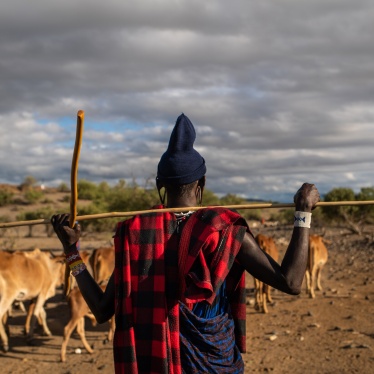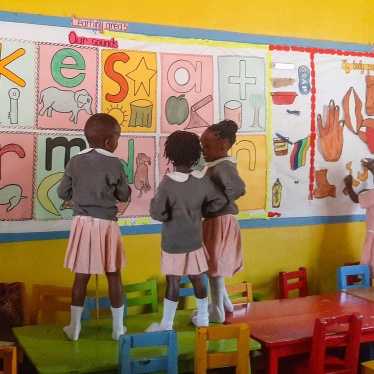(Paris) – The French Ministry of Justice should move swiftly to issue an international arrest warrant for the son of President Teodoro Obiang Nguema of Equatorial Guinea, EG Justice, Human Rights Watch, and SHERPA said today. On April 11, 2012, judicial sources confirmed that a French public prosecutor has endorsed the request of investigating magistrates to issue a warrant for Teodoro Nguema Obiang Mangue (“Teodorín”) over allegations of money laundering in connection with his lavish purchases in France.
As a next step, the French Justice Ministry is expected to circulate the warrant through European and international law enforcement databases known as the Schengen Information System (SIS) and Interpol to seek his arrest.
Teodorín serves as Equatorial Guinea’s minister of agriculture and forestry and vice president of the ruling party. He is widely expected to succeed his father under constitutional changes pushed through in November. Equatorial Guinea is an oil-rich West African country with rampant high-level corruption and disproportionately high rates of poverty given the nation’s per capita wealth. Teodorín is under investigation in the United States and France, where investigating magistrates suspect that the president’s son’s purchases were made possible by the misuse of the country’s natural resource wealth.
“High-level corruption in Equatorial Guinea would entail a huge cost for the people of the country,” said Tutu Alicante, director of EG Justice, a US-based group that advocates for human rights and the rule of law in Equatorial Guinea. “France should do its part to combat corruption and impunity by fighting money laundering vigorously.”
In February, French police raided a mansion used by Teodorín in Paris and seized at least two truckloads of valuables worth an estimated total of at least 40 million Euros – reportedly including a 1.5 million Euro desk that belonged to King Louis XIV. In September 2011, police raided the same mansion and seized at least 11 high-end sports cars belonging to Teodorín.
France opened its official investigation following a legal complaint filed by SHERPA, a human rights group, and Transparency International France against several African leaders for allegedly using public funds to buy luxury properties and goods in France. Just two weeks after the September raid and seizure, President Obiang appointed Teodorín as the country’s permanent assistant delegate to UNESCO. A coalition of groups, including EG Justice, Human Rights Watch, and SHERPA, condemned the move as an effort to provide him diplomatic immunity from prosecution in France as the investigation against him gains momentum.
“It is unacceptable for political leaders to use an international organization such as UNESCO as a shield against justice,”said William Bourdon, president of SHERPA. “The French Ministry of Foreign Affairs is the only institution with the power to halt this nomination, and it should take action to block it.”
SHERPA has initiated an online petition calling on the Foreign Ministry to deny Teodorín the visa required to assume the post at UNESCO.
In a separate action, the United States government has moved to seize more than $70 million in US assets belonging to Teodorín, alleging that they were purchased with money obtained from “extortion and/or the misappropriation, theft, or embezzlement of public funds.”
Teodorín’s lavish global spending habits contrast sharply with the harsh daily realities endured by the majority of people in Equatorial Guinea. Most lack reliable access to even basic services like safe drinking water, electricity, and affordable healthcare. Recently, residents of the capital, Malabo, suffered through a water shortage caused by the city’s dilapidated water system.
President Obiang, in power since 1979 and the world’s longest-ruling leader, leads a government with vast revenues from oil that make the country the richest in Africa on a GDP per-capita basis. Yet it has prioritized spending on luxury resorts, presidential palaces, and other big-ticket projects over social spending to address the needs of ordinary citizens.
According to the United Nations’ 2011 Human Development Report, Equatorial Guinea ranks 136 out of 187 countries in the Human Development Index, despite a very high per-capita GDP of $31,779. As a result, Equatorial Guinea has by far the largest gap of all countries between its wealth ranking and its human development score. The country’s poor social indicators include high child mortality rates. Nearly one in eight children dies before reaching age 5.
Government critics face severe repression. One of the country’s most skilled physicians, Dr. Wenceslao Mansogo Alo, has been unjustly imprisoned since February 9. A verdict in the politically motivated trial against him is pending. In addition to operating his own health clinic, Mansogo has been a prominent human rights activist and leading opposition party member.
President Obiang defended his son in a France 24 television interview aired on April 10, saying his wealth had come from business ventures and not state funds. Teodorín’s lawyer in France has objected to the pursuit of a warrant against his client as “totally incomprehensible.”
The Equatoguinean government has threatened the French government with retaliatory measures over what it alleges to be an attempt “to provoke an internal destabilization” of Equatorial Guinea. On April 9, it confirmed that it had deported a French businessman the week before, alleging in an official statement that he caused “public alarm” by distributing a leaflet bearing the letterhead of the French embassy that provided information for French citizens in Equatorial Guinea about telephone contacts and places of refuge in case of danger.
On March 30 approximately 2,000 Equatoguineans gathered in front of the French embassy in Malabo to protest the actions against Teodorín in France. The government of Equatorial Guinea later reported that “hundreds of thousands” participated in “peaceful mass demonstrations” in Malabo. The country’s total population is estimated at 700,000.
In contrast, in March 2011 the government refused to allow an opposition party to hold a demonstration, and in November 2011 government security forces arrested and held for three days an opposition member who was working to organize rallies against the government’s proposed constitutional changes.
“Repression and corruption often go hand-in-hand,” said Arvind Ganesan, business and human rights director at Human Rights Watch. “This is the sort of case that should be pursued to send a message that the international community will not let officials travel the globe to launder natural resource wealth for personal gain.”






